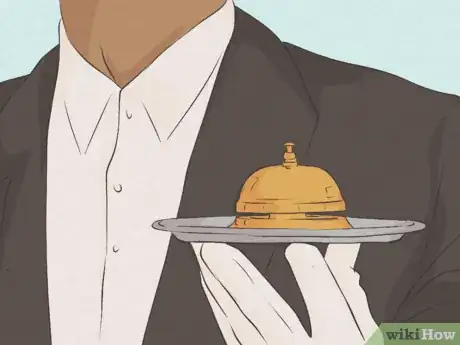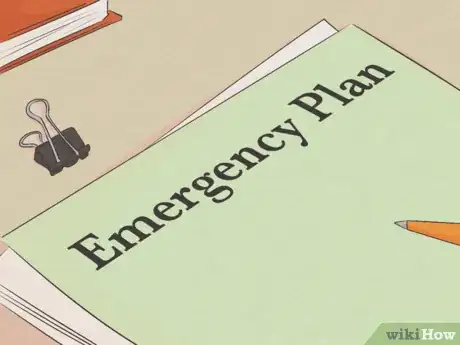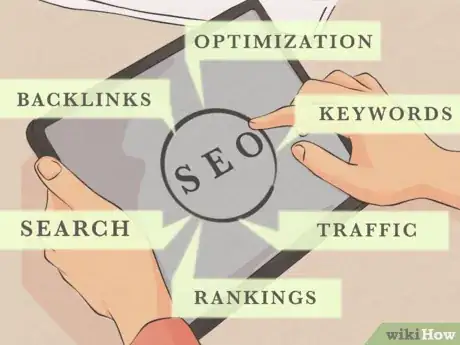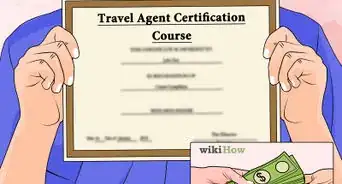This article was co-authored by Jessica Villegas. Jessica Villegas is a Certified Academic Life Coach and the Founder of Hi-Lite Coaching + Consulting in Winter Garden, Florida. Jessica has over 20 years of leadership experience, and she and her team serve teens and young adults through private coaching, group coaching, workshops, and speaking engagements. She uses workbook exercises, coaching planners, and regular check-ins to support young adults in achieving their academic and personal goals. Jessica received her Bachelor’s in Organizational Communications and Leadership Studies from the University of Central Florida and her Professional Coaching certification through Coach Training EDU, an ICF Accredited Institution, as an Academic Life Coach.
There are 10 references cited in this article, which can be found at the bottom of the page.
wikiHow marks an article as reader-approved once it receives enough positive feedback. In this case, several readers have written to tell us that this article was helpful to them, earning it our reader-approved status.
This article has been viewed 143,354 times.
Managing a hotel requires you to pay attention to many things at once. You need to start with a well-trained staff and oversee their work. You need to address the needs of your customers, to keep them satisfied and coming back to the hotel. As a manager, you should always be looking to the future, planning ahead for emergencies and finding ways to improve and grow. Finally, part of managing a successful hotel today requires you to manage your online presence and use technology to increase advertising.
Steps
Managing the Staff
-
1Hire good people. As a hotel manager, you rely on good staff members. This includes everyone from the desk clerk to the maids to the custodians. You want your guests to see efficient and helpful staff members who enjoy and are proud of their work. You need to be able to rely on your staff to do their jobs as expected, without excessive oversight.[1]
- You should find out from the hotel owners or managers over you whether you have authority to fire and hire new staff members, if necessary.
-
2Communicate regularly with staff. Maintain regular dialogue with your staff members. They need feedback about the quality of their work, both good and bad. You also need to communicate regularly with hotel staff about any changes or special events that may be coming up. Surprises are nice for guests, but not for employees.[2]
- Remember that good communication goes both ways. Encourage staff members to speak to you, and listen to what they say. Staff should report any concerns they have or problems that they see throughout the hotel. This will help you correct things before the guests notice them.
Advertisement -
3Delegate and encourage independence. Realize that you cannot do everything by yourself. Decide which duties you can delegate to appropriate staff members and encourage them to work independently. Find the effective level between your personal involvement and over-supervision.[3]
- For example, if your hotel includes a restaurant, you may not personally need to assign the work schedule for waitstaff. Delegate that task to a “head waiter” or allow the waitstaff to work as a team to develop a functioning schedule. You may still need to provide some oversight, but delegation is the key to higher productivity.
-
4Encourage positive morale. Your hotel guests will expect a positive experience when they visit, and that comes from the staff working around them. As the manager, you need to foster enjoyment among your staff. Go beyond just keeping your staff well paid. Find ways to encourage positivity throughout your hotel. Some ideas might include:[4]
- Institute an incentive program for staff members with solutions to problems.
- Provide positive feedback whenever you can.
- Recognize staff members publicly for good work.
- Host occasional social events for your staff.
-
5Provide continued training for staff. If you want your hotel to improve overall, your staff should be encouraged to improve individually. Provide job-appropriate training opportunities. These might be workshops on improving customer relations or cooking classes for your restaurant staff. Talk with your staff to learn their needs. You can also research industry publications for additional ideas.[5]
- You should always provide adequate mentorship and training for new staff members.
- Providing opportunities for staff to learn and move up within the hotel promotes overall morale and helps you develop well-rounded employees.[6]
Providing the Best for Your Guests
-
1Make a positive first impression. Consider your guests' first contact with your hotel and do what you can to make that as positive as possible. If you have parking attendants, they should greet guests warmly and treat the cars with respect. If you can afford a doorman, guests should be welcomed and guided in to the hotel lobby. Your desk clerks should always be attentive and friendly. As the manager, you need to impress the importance of the first impression on all your staff.[7]
-
2Provide an attractive setting. You always need to look at your hotel with the eyes of your guests. Ask yourself if it looks attractive, and find ways to improve it. You may need to hire a groundskeeper or landscaper. You should have a cleaning staff, and supervise their work so they meet your standards. Ensure that all fixtures are working and up to current expectations.
- You may be limited by your location, but you can always do something to make your hotel attractive. If you are in the middle of a large city, you obviously cannot provide an attractive front lawn. Even so, you can bring potted plants and indoor decorative trees to your lobby to provide a fresh appearance.
- Small touches, like providing artwork for the guestrooms and public areas, can greatly improve the appearance of any hotel.
-
3Look for ways to be helpful. Guests will remember people who go out of their way to be friendly and helpful. This may include opening a door, holding an elevator, or carrying luggage into the room. As the manager, you can hire the appropriate staff to provide services. If the hotel budget does not include such staff as bellhops and doormen, you can still encourage your staff to be as helpful as possible.[8]
-
4Stress staff courtesy. Your staff need to treat all customers with courtesy and respect. Managing a hotel is a service industry, and you and your employees need to realize that you are there to serve the guests. Even when a guest is rude, inappropriate or demanding, the staff needs to be respectful.[9]
- Encourage staff to listen to what a guest says rather than how the guest says it. A rude or demanding attitude is generally the guest's way of expressing that something is wrong. Find the source of the problem and correct it.
- Remember that an apology goes a long way.
-
5Provide clean, comfortable rooms. Customers will expect the rooms they stay in to be clean and well arranged. Work with your cleaning staff regularly to make sure that rooms are kept up to your standards. Work with the owners or higher management to make any overall changes to the structure or style of the rooms.
- Consider what extra amenities you can provide in the rooms. For example, guests commonly expect color television. But you may be able to expand their cable or satellite access.
- Some hotels provide coffee makers or even microwave ovens and small refrigerators in the rooms. These can add to your guests' comfort.
-
6Follow up on guest satisfaction. Hotel guests appreciate attention and knowing that they are being looked after. You may want to institute a formal system for feedback, such as a questionnaire card for guests to complete in their rooms.[10] You should also informally just greet your guests and ask, “How is everything going? Is there anything else we can do for you?” Simple attention like that goes a long way toward customer satisfaction.[11]
Running the Business Operations
-
1Set and meet sales and profit targets. Your primary duty as manager is to make the hotel profitable. You need to use your own records and industry research to forecast busy travel times. You should know the customary rates for hotels like yours and set your rates accordingly to be competitive. You need to set prices low enough to encourage business but high enough to earn money.[12]
- Adjust as needed. A good budget should be a fluid tool for your business. If you need to increase income, you may need to adjust prices. During slow travel periods, you might decrease rates to encourage business. During busy times, rates can go up.
- If finances are not a strength of yours, you may be able to find individual classes at a nearby hotel management college program.
-
2Operate within the hotel's budget. As the hotel manager, you will be responsible for the hotel's financial success. You will be expected either to create an operating budget or at least apply a budget that has been set for you. You must be comfortable working with numbers, reading and applying a budget, and planning for the hotel's financial success. An MBA is not required but is increasingly useful in becoming a hotel manager. Working with a budget includes the following specific details:[13]
- Forecast expected income. You will need to read industry reports and follow trends in the market to plan ahead for sales.
- Plan your expenses. You should be able to match your needs to your expected customer flow. As the number of guests increases, your need for expendable supplies will likely increase. You will also have certain fixed expenses (utilities, salaries, maintenance) that you must manage.
-
3Build relationships with suppliers. You will be responsible for purchasing supplies and equipment for the hotel. You should know your suppliers and generate positive relationships. Make your payments on time. Study the industry and get to know the products and prices that are available.[14]
- If you make occasional visits to the supplier's office, you can personalize the relationship even more. This can lead to better service.
- Usually, you will want to build steady relationships with suppliers, so you are not constantly making up new orders for supplies. Occasionally, however, you should study the market and see if other suppliers might work better for you. If you have a longstanding relationship with one dealer, but someone else is offering better prices, you may want to ask your first dealer to match the price. This can help you keep expenses down.
-
4Advance your brand. If you are part of a chain, then other people may be involved in the overall marketing. But you will certainly play a role in advancing the company's brand and image. You need to know your hotel's strengths as well as its weaknesses. Help develop a direction and focus for your hotel, and train your staff to follow it.[15]
- For example, if you manage a Motel 6, you should realize that you are not a luxury brand. Nevertheless, you can encourage your staff to maintain a clean, comfortable atmosphere where guests will feel welcome.
- If you are managing a top-level luxury hotel, you will uphold higher standards. Train your staff to meet those standards.
Planning Ahead
-
1Consistently forecast inventory needs. As a hotel manager, you must make sure that your supplies are stocked. This includes office equipment for the front desk, clean sheets and towels for the rooms, and food supplies for the restaurant. If you have such special amenities as a pool or golf course, you need to review them regularly to make sure that you always have what you need. You cannot afford ever to run out of something.[16]
-
2Look for ways to grow. The job of a hotel manager includes not only maintaining a good operation but also looking for ways to improve it. You might consider expanding the number of rooms you have or the hours that your restaurant is open. If you can afford it, you might hire more staff to provide more attentive customer service. You should always be looking at your hotel with a critical eye and trying to improve.[17]
-
3Keep ahead on routine maintenance. Whether you hire permanent custodians or you contract out for service technicians, you need to keep the hotel in good condition. Establish a routine schedule for checking such things as heating and cooling systems, plumbing, and appliances in the kitchen as well as in all the rooms. You should discover any malfunctioning equipment on your own rather than hearing about it from customers.
- Regularly check heating and cooling systems in every room to be sure they are in working order. These are things that will cause guests to ask to change rooms, which can be disruptive to your scheduling.
-
4Develop and publicize emergency plans. You are responsible for the welfare and safety of your guests. You should have plans in place for small occurrences, like an individual illness in the middle of the night, and also for large events like a fire or other disaster. Try to think of anything that might go wrong, especially during difficult or inconvenient times, and plan how you and your staff will respond.[18]
- Develop an evacuation plan for the entire hotel in case of fire or other large emergency. Post evacuation routes in individual rooms and hallways.
- Educate your staff of all emergency plans. Everyone should know his or her role in case of an emergency.
- Provide working emergency response equipment throughout your hotel. This will include smoke alarms and detectors, fire extinguishers, first aid kits and AEDs (automated external defibrillators). Educate your staff in using all safety equipment.
Using Online Resources
-
1Maintain an attractive website. Many travelers book hotels by doing their own online research. You need to have a website that is engaging, attractive, and easy for your prospective customers to use. Post attractive photographs, including the interiors of the rooms, public areas and the grounds of your hotel.[19]
- Make sure your website is easy to navigate. If guests have trouble making a reservation on your website, they are likely to move on to another hotel whose website is easier to use.
-
2Use social media to increase advertising. You can make great use of Facebook, Twitter and YouTube for little or no cost. These social media sites are becoming increasingly valuable as the source of information for many travelers. If you maintain an active online presence, you can decrease your more traditional advertising budget. You may even consider hiring a social media specialist to manage all the opportunities for you.[20]
- Create your own YouTube channel. Then, for very little cost, you can develop a brief video (think “commercial”) about your hotel and post it.[21]
- Maintain a Facebook page for your hotel. Keep it current. Post updated photos and news items about coming events, at your hotel or in the local area.
- Use '@' in Twitter to link to local attractions and events.
-
3Optimize your online search presence. When people search for hotels in your area, you want your hotel to come up near the top of the search results. Internet search engines use algorithms that rank search results based on their content and structure. If you can tailor your website to the particular algorithms, you can reach more customers when they look for hotels.[22]
- It may be worth investing some money in hiring someone to help you with what is called SEO, Search Engine Optimization.
-
4Maximize outreach with travel sites. Make sure that your hotel is listed on such travel sites as Expedia, Kayak and Priceline. These will increase your visibility and draw more customers. Through them, you can provide your customers with the opportunity to book their rooms online.[23]
-
5Monitor customer feedback online. Regularly review such response sites as Yelp and TripAdvisor. Read the reviews that your customers are posting and take action to respond to them. Realize that you do not need to respond to each review. However, if you see a trend, you should take action.[24]
- If one person responds about poor cleanliness, for example, that one person may have just been overly picky. But if you see many comments about cleanliness, then you should carefully examine your rooms and cleaning routines.
- Post responses to customer reviews. If you take action in response to a particular review, you should post a note and let people know. Even if you cannot take immediate action, you should acknowledge the customer's dissatisfaction and express your plan to improve.[25]
Community Q&A
-
QuestionI have been giving the responsibility to manage an 8 bedroom guest house. This is difficult because the past manager left no records. What can I do?
 Community AnswerThis will be difficult at first. You need to use your best judgment for ordering supplies and adapt quickly if you find out that you are short or over.
Community AnswerThis will be difficult at first. You need to use your best judgment for ordering supplies and adapt quickly if you find out that you are short or over. -
QuestionHow can I improve a small hotel?
 Community AnswerMake it more vibrant and/or add greenery (trees, flowers, grass, etc.). A hotel is very welcoming when it's organized and it looks good, in addition to having good service. Make sure the beds are made, put some lavender scent in the air, and just make the customer feel like their room is brand new and that it is their home.
Community AnswerMake it more vibrant and/or add greenery (trees, flowers, grass, etc.). A hotel is very welcoming when it's organized and it looks good, in addition to having good service. Make sure the beds are made, put some lavender scent in the air, and just make the customer feel like their room is brand new and that it is their home. -
QuestionI have just finished a 12-room guest house, which is hard to maintain. How can I make a profit?
 Community AnswerThe key to a successful business in hotel accommodation is having nice rooms in a nice location for a nice price. However, in my opinion and in past experiences I have learned that having good branding is also important, meaning a nice looking logo and website.
Community AnswerThe key to a successful business in hotel accommodation is having nice rooms in a nice location for a nice price. However, in my opinion and in past experiences I have learned that having good branding is also important, meaning a nice looking logo and website.
References
- ↑ http://blog.ampli.com/2014/07/top-10-hotel-management-tips-for-the-hospitality-industry.html
- ↑ http://blog.ampli.com/2014/07/top-10-hotel-management-tips-for-the-hospitality-industry.html
- ↑ http://blog.ampli.com/2014/07/top-10-hotel-management-tips-for-the-hospitality-industry.html
- ↑ http://blog.ampli.com/2014/07/top-10-hotel-management-tips-for-the-hospitality-industry.html
- ↑ http://blog.ampli.com/2014/07/top-10-hotel-management-tips-for-the-hospitality-industry.html
- ↑ http://www.acs.edu.au/info/hospitality/hospitality/manage-hotels.aspx
- ↑ http://blog.ampli.com/2014/07/top-10-hotel-management-tips-for-the-hospitality-industry.html
- ↑ http://blog.ampli.com/2014/07/top-10-hotel-management-tips-for-the-hospitality-industry.html
- ↑ http://blog.ampli.com/2014/07/top-10-hotel-management-tips-for-the-hospitality-industry.html
- ↑ https://rategain.com/blog/how-to-manage-hotel-online-reviews/
- ↑ http://blog.ampli.com/2014/07/top-10-hotel-management-tips-for-the-hospitality-industry.html
- ↑ https://www.prospects.ac.uk/job-profiles/hotel-manager
- ↑ http://www.investopedia.com/articles/07/budgetingforcompanies.asp
- ↑ https://www.entrepreneur.com/article/206530
- ↑ http://hotelexecutive.com/business_review/2426/five-top-secrets-for-successful-hotel-branding
- ↑ http://blog.ampli.com/2014/07/top-10-hotel-management-tips-for-the-hospitality-industry.html
- ↑ http://blog.ampli.com/2014/07/top-10-hotel-management-tips-for-the-hospitality-industry.html
- ↑ http://blog.ampli.com/2014/07/top-10-hotel-management-tips-for-the-hospitality-industry.html
- ↑ https://tympanus.net/codrops/2010/01/23/24-beautiful-hotel-website-designs-to-get-inspired/
- ↑ http://blog.ampli.com/2014/07/top-10-hotel-management-tips-for-the-hospitality-industry.html
- ↑ https://www.xotels.com/en/marketing/top-10-social-media-marketing-tips-for-hotels
- ↑ http://searchengineland.com/guide/what-is-seo
- ↑ http://blog.ampli.com/2014/07/top-10-hotel-management-tips-for-the-hospitality-industry.html
- ↑ http://blog.ampli.com/2014/07/top-10-hotel-management-tips-for-the-hospitality-industry.html
- ↑ https://rategain.com/blog/how-to-manage-hotel-online-reviews/
























































































